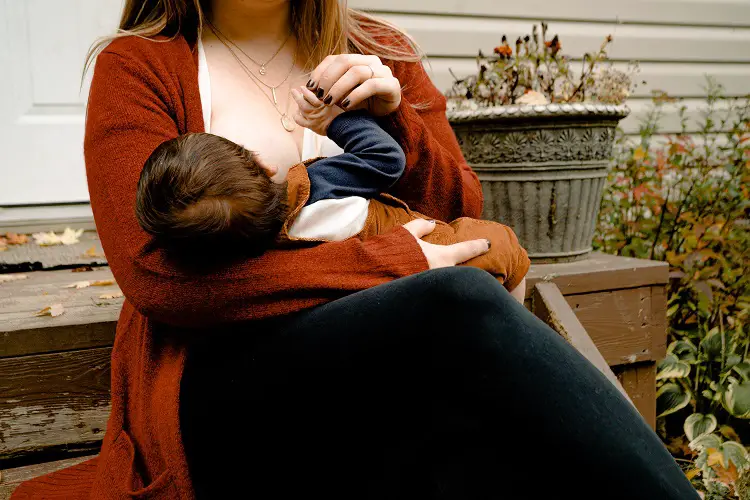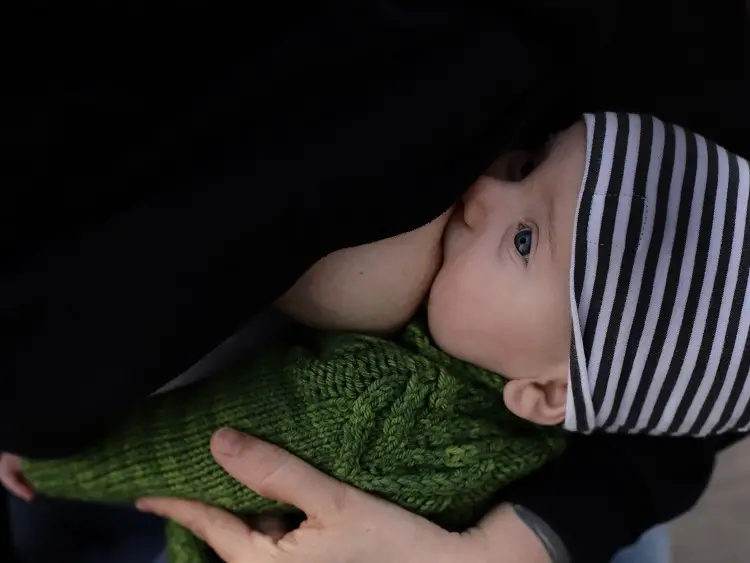The joy of being a mother is one of the most wonderful experiences in a woman’s life, but this period can turn into a nightmare if your baby cries incessantly regularly.
Are you wondering what to eat to prevent gas while breastfeeding? We all are familiar with the sayings, “breast milk is the best milk,” “it’s the most complete baby food,” and “breast milk is ultimate liquid gold.”
Even health experts believe that breast milk is the ultimate standard for infant nutrition since it provides the baby with healthy nutrients for maximum growth and development.
But if breast milk is the “basic of life” and so important for my baby’s development, why is she so fussy and gassy? Is she allergic to my milk? Could she be allergic to my milk? Am I doing something wrong?
All these are common questions and concerns amongst breastfeeding mothers. While some women may decide to give up on breastfeeding due to out of fear, you don’t have to.
In this article, we will be discussing signs and symptoms of gas in breastfed babies, what to eat to prevent gas while breastfeeding your baby, and other things you can do to help your baby with gas.
Common Signs & Symptoms of Gas in Breastfed Baby

Gas normally is a part of the gastrointestinal (GI) system, and each one of us produces and expels it from time to time. For breastfeeding babies, gas might be a result of eating too fast, swallowing too much air, or digesting certain foods.
And since a baby’s gastrointestinal (GI) system is not fully developed, they can frequently experience this as well. This is why burping them after feeding is important.
Burping babies after each feed can help release gas from their stomachs. You’re your baby is not burped properly, the gas might not pass. Hence, causing discomfort and bloating. To learn the best ways to burp your baby, read this post.
Here are the common symptoms of gas in breastfed babies:
- Baby cries while passing gas or soon after, especially if the baby cries when she is unlikely to be hungry or tired
- Arching the back
- Lifting the legs
- The Baby’s stomach is looking swollen
- Passing gas or belching
What Causes Gas in Breastfed Babies?
Gas is a normal part of all breastfed babies. Some of the major reasons why this happens are as follows.
- Baby Swallows air: Usually, babies are at risk of swallowing air when they breastfeed incorrectly or bottle-fed in specific positions.
- Excessive crying: When babies cry they take in a lot of air, and when this happens, it can be difficult for you as a parent to determine whether the gas is responsible for the cry or if the cry is causing the gas. However, soothing the baby the sleep is essential to avoid these problems.
- Digestive issues: Catching a bug or immature gastrointestinal system can cause a lot of gas in babies. Therefore, if you notice that your little one is frequently gassy, you should consult with your health care provider.
- Mom’s diet: A lot of moms become concerned about how what they eat contributes to their baby’s gas and fussiness. Some certain diets you eat can cause intestinal issues in your baby’s stomach.
So you must ensure to avoid certain foods as you breastfeed your gassy baby which we mentioned in the section below under what to eat to prevent gas while breastfeeding.
Read Also: Best Formula For Acid Reflux and Gas
What To Eat To Prevent Gas While Breastfeeding: 9 Foods To Avoid

There may be no such special foods we can classify as the best foods to eat to prevent gas while breastfeeding, however, there are certain food you must avoid eating as you breastfeed your gassy baby or if you want to avoid gassiness in your baby.
According to experts, a healthy meal plan ensures your breast milk provides tremendous benefits to your baby. So, as a breastfeeding mother, you must take the necessary precautions and avoid the following foods.
1. Aerated beverages
As a breastfeeding mother eating aerated beverages can increase toxins in your body.
As a result, this affects your baby’s health and causes significant gastrointestinal problems and gas. Alternatively, it is best advised to go for naturally squeezed fruit drinks or lemonade.
2. Caffeine
Caffeinated beverages whether it is tea or coffee can be harmful to your breastfed baby, which can result in gas and bloating in your baby.
3. Certain vegetables
During breastfeeding, it’s best advised to do a lot of research on what to eat or what not to eat when breastfeeding a baby.
Certain vegetables like kidney beans, soy, broccoli, cauliflower, and kale promote gas in both adults and babies. Aside from causing gas, they also support colic and abdominal discomfort.
4. Energy drinks
As a breastfeeding mother, it’s best advised to avoid energy drinks completely. Consuming them can pose a serious threat to your baby’s health since they are rich in preservatives and harmful chemicals.
Aside from making your baby uncomfortable, it can also result in long-term issues with his digestive tract.
5. Hot, spicy, and garlicky foods
Consuming spicy or garlicky foods can take a toll on your breast milk as it changes the flavor of your milk. Your breastfed baby also can face a lot of discomfort from this since it interferes with the baby’s digestive system.
Read Also: Does Kissing Your Baby Changes Your Breast Milk? Find out!
6. Nuts
Nuts are a wonderful source of protein and fats, but consuming certain like almonds or cashew nuts may cause the formation of gas and tummy problems in babies.
7. Fast foods
Junk foods are rich in highly processed components with a lot of preservatives. They lack healthy nutrients, which are usually not good for your health and your baby’s.
Consuming this kind of food can cause colic and all kinds of harmful health conditions in babies.
8. Dairy products
Consuming a high level of dairy in your diet can cause colicky symptoms in babies. This food affects your baby’s proper digestion and supports cramps and bloating.
9. Eggs
Consuming egg whites can cause a lot of gastric problems in some babies. Therefore, if you’re a breastfeeding mom that consumes egg whites regularly and notices your little one is gassy, it’s best advised to change your diet.
Read Also: 3 Best Foods To Consume When Breastfeeding a Sick Baby
Other Things You Can Do To Help Your Baby With Gas
1. Apply gentle pressure to your baby’s stomach: One of the most effective things to do to help relieve gas is to apply gentle pressure to your baby’s stomach to soothe him/her.
To do this effectively, make sure you wait for at least 30 minutes after each feed before doing.
2. Burping the baby: Burping your baby during and after feeding is very important! Have a short break in between feeds to burp your baby to avoid gas. Its best advised burping your baby in an upright position.
3. Infant massage: Practicing infant massage on your baby’s tummy can help relieve gas relief.
To do this properly your baby should be laid on her back while you rub her tummy gently in a clockwise motion. This technique helps in moving gas along and soothing the intestinal tract.
4. Bicycle your baby’s legs: By keeping your little one active, you can help them relieve gas. Another way to do this is by bicycling your baby’s legs for a short period using a circular motion. This practice is both fun and beneficial for your baby’s health!
5. Keep a track of what you eat: As mentioned earlier, what you eat when you breastfeed your baby can affect your baby either positively or negatively.
Keeping track of what you eat when breastfeeding will help you identify foods that cause gas in your breastfed baby. We all know babies can adapt fast to you getting into a new diet but that shouldn’t be a reason to overdo it!
Just make sure you follow a healthy meal plan with a lot of healthy nutrients to boost the nutritional intake of your milk.
6. Shorter Nursing Time: Breastfeeding for shorter periods at regular intervals will help your baby digest the milk better while avoiding gas.
7. Seek Help: Do not forget to seek medical advice on the best meal plan while breastfeeding your baby.
Related Articles:
- Can I Drink Emergen-C While Nursing
- Can I Do Sauna While Breastfeeding?
- Can I Eat Chicken Curry While Breastfeeding
- List Of Foods That Makes Breast Milk Taste Good
- How Long Can a Breastfeeding Baby Go Without Pooping?
Take-Home
We hope this article has given an in-depth discussion to answer the question of what to eat to prevent gas while breastfeeding. Consuming nutritious foods like fresh fruits and fish can help prevent gas and also provides you and your baby with the necessary nutrients needed.
By paying close attention to what you eat and avoiding the foods listed above can help you decrease the chances of your baby getting gassy.
We suggest you discuss with your pediatrician the best meal plan to support your baby’s health. And, of course, always seek medical advice if your baby keeps experiencing significant discomfort!
Let us know if you have any other suggestions on what to eat to prevent gas while breastfeeding or any other foods to avoid when breastfeeding a baby to avoid gas, kindly drop a message with us.
